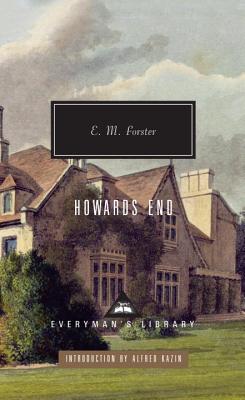
by E. M. Forster
From: Why We Should Read, by S. P. B. Mais, (1921)We read Howard's End for its unexpectedness, its elliptic talk, which so exactly hits off the characters he creates, for its manifestation of the Comic Spirit....
We read Howard's End for the merciless skill which E. M. Forster shows in laying bare the soul of Leonard Bast, the clerk in the insurance office, who reads Ruskin and goes to the Queen's Hall in order to improve himself, who is dragged into the gutter by his loose-living mistress ("she seemed all strings and bell-pulls, ribbons, chains, bead necklaces that chinked and caught—").... We read Howard's End for the equally merciless sketch of the millionaire husband of the heroine ("a man who ruins a woman for his pleasure, and casts her off to ruin other men. And gives bad financial advice, and then says he is not responsible. These men are you. You can't recognise them, because you cannot connect. I've had enough of your unweeded kindness. I've spoilt you long enough. All your life you have been spoiled.... No one has ever told what you are—muddled, criminally muddled").If we demand of modern novels that they should portray human character exactly as it is and that the author should have a definite standpoint for his philosopher of life, one need quote no further to prove that in Howard's End these two desirable factors are to be found in profusion. Mr E. M. Forster is a conscious artist of a very high order and our only quarrel with him is that he writes too little.
Media reviews not yet available.
This information about Howards End was first featured
in "The BookBrowse Review" - BookBrowse's membership magazine, and in our weekly "Publishing This Week" newsletter. Publication information is for the USA, and (unless stated otherwise) represents the first print edition. The reviews are necessarily limited to those that were available to us ahead of publication. If you are the publisher or author and feel that they do not properly reflect the range of media opinion now available, send us a message with the mainstream reviews that you would like to see added.
Any "Author Information" displayed below reflects the author's biography at the time this particular book was published.
Edward Morgan Forster, generally published as E.M. Forster, was an novelist, essayist, and short story writer. He is known best for his ironic and well-plotted novels examining class difference and hypocrisy in early 20th-century British society. His humanistic impulse toward understanding and sympathy may be aptly summed up in the epigraph to his 1910 novel Howards End: "Only connect".
What really knocks me out is a book that, when you're all done reading, you wish the author that wrote it was a ...
Click Here to find out who said this, as well as discovering other famous literary quotes!
Your guide toexceptional books
BookBrowse seeks out and recommends the best in contemporary fiction and nonfiction—books that not only engage and entertain but also deepen our understanding of ourselves and the world around us.